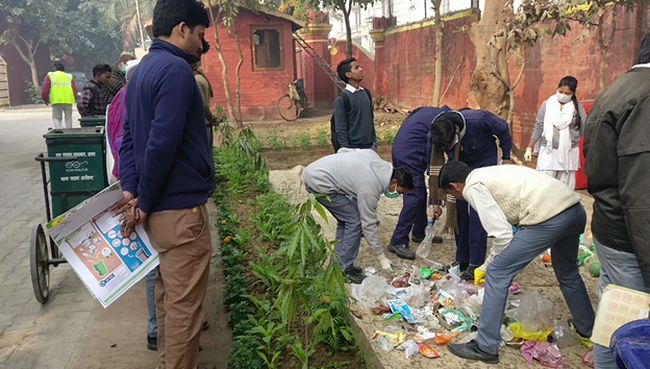New Delhi: Agra, famous of course for the Mughal marvel – Taj Mahal but equally infamous for the filthy drains, unpicked garbage, and the dirty Yamuna. Studies done on city’s waste production highlights that Agra generates around 960 metric tonnes per day of Municipal Solid Waste, out of which 65% comes from the residential/tourist areas, 18% from commercial areas, 13% from institutional areas and 4% from industrial sectors. However, the problem is not waste production but the large amount of waste which is being dumped straight into the water bodies or landfills without any treatment. The end result is the tag of the ‘filthy city’ of India. In the recently held Swachh Survekshan 2017, Agra was ranked 264 out of 434 cities and a major reason for it to lag behind was poor cleanliness and waste management.
Hoping to make a dent in tackling this huge problem and to bring in an effective change, two engineers – Himanshu Mishra and Rahul Jain from Agra started Go Get Garbage, an organisation that is working towards finding effective solutions to waste management in the city.
Also Read: Comic Book Returns, This Time To Teach India The Importance Of Human Waste Treatment
We were always moved by the fact that the city which we live in is regarded as the most dirties city of India. There is so much of waste in the city already and at the end of the day we are also just adding up to these trash mountains in the city by dumping our waste directly without any treatment, says the duo who connected which each other via environmental friendly forums in Agra.
Today, these waste warriors have set up 2 resource recovery centres (RRC) in Agra and are diverting 95% of the waste of around 1000 houses which normally used to make its way into the dying Yamuna or the landfills.

The major activities carried out by Resource Recovery Centres in Agra are – Collection, Processing and Selling
So, what exactly are they doing? The team at the resource centre segregates the household waste which they collect from 1,000 households with the help of local urban bodies and then treat it effectively.
Explaining the structure of Go Get Garbage, Himanshu Mishra who has done his Masters from Indian institute of Science (IISc), Bengaluru before shifting to his hometown Agra, said, We have adopted simple 3 pillars formula – adopt the decentralised method of waste management, waste should be treated as a resource and lastly waste management should be visible, currently just the waste is visible.
He further added, “Initially we started with an awareness and education campaign because we wanted to bring in the behavioural change among people which is the root cause of bad waste management in the city. But, from the ground, we realised that if we want to change the system we need to get our hands dirty and find out solutions.”
The duo plans to set up 100 resource centres in Agra by March 2018 which will cover around 1 lakh households and manage 5,000 tonne waste every month.
Typically when a household discards waste without segregating it reaches the landfills or dumping yards of the city only in the end. Usually, around 60% of the waste we discard can be composted, 25% can be sent for further recycling and the rest 15% can be treated as a dead waste which includes sanitary waste or bio-medical waste. So, a lot of waste if treated well can become a resource, in our country the problem lies with waste segregation only, that’s the key to successful waste management and it is not being done. If you see other countries, you will see they don’t have waste issues because there waste segregation is much more adopted term. India lags behind and our resource centres are there just to change this scenario and bring in this behavioural change among people, said Himanshu Mishra.
Apart from this, the team is also trying to set up a waste treatment plant for petha waste generated from the famous delicacy of the city made from white pumpkin and sugar. The making process of petha is a huge source of waste in the city. The aim is to make petha waste compostable or transform it into animal feed.
The message the duo have for everyone – You don’t need any third party to come and take action for the thing you as an individual are responsible for. The need of the hour is to get together and form groups and take up initiatives like these – adopt waste segregation as a mantra and make a difference.
Got A Similar Story? Share The Swachh Story With Us































